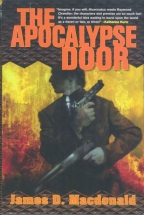The Apocalypse Door
James D. Macdonald
Tor / Tom Doherty Associates
US Hardcover First
ISBN 0-312-86988-6
Publication Date: 11-01-2002
224 Pages; $22.95
Date Reviewed: 03-17-03
Reviewed by Rick Kleffel © 2003

REFERENCES
COLUMNS
|
|
|
The Apocalypse DoorJames D. MacdonaldTor / Tom Doherty AssociatesUS Hardcover FirstISBN 0-312-86988-6Publication Date: 11-01-2002224 Pages; $22.95Date Reviewed: 03-17-03Reviewed by Rick Kleffel © 2003 |
|
|
REFERENCES |
COLUMNS |
Let's just be done and call 'The Apocalypse Door' a piece of fiction. It's too many pieces of too many things to fit comfortably into any single or even multiple genres. It's a thriller set a world much like ours, but for the fact that Evil -- in the old fashioned Catholic version of the word -- is alive and well as are the Knights Templar. There's a wealth of imagination that has gone into Macdonald's setup, and some nice touches to cement the whole shebang together. 'The Apocalypse Door' is a fine but thin thriller.
In many ways, the thinness is an asset. Macdonald drops us into the action as Peter Crossman and his new partner Simon seek some missing UN peacekeepers. What they find instead is a box full of fleshy mushrooms that shrink from the sign of the cross and bleed when cut. It's a bad sign. While the armies aren't massing on the plains of Megiddo, there are some disturbing reports from recent deep-space probes that indicate the material in the cosmos may be undergoing a change. No, the monks in some obscure Tibetan abbey aren't running a computer program. It's much worse than that. Simultaneously, Macdonald takes us back 20 years in the past when we meet a young CIA operative deep "in country" trying to find a missing gringo somewhere in South America. It looks as if it will be a terminal task.
Macdonald's narrative in the present is zippy, inventive and nicely consistent. Our hero is constantly worried about the state of his soul and the souls of those he must dispatch. How many other secret agent thrillers have you read where the spy is giving his victims their last rights? Macdonald plays all this absolutely straight. There's no attempt at the kind of winking satire that one might expect with such a setup. That's the point. It's a setup, not a send-up. Some readers might find it reads like satire, but if so, the jokes are very low-slung and aerodynamic, so as to ensure that nothing slows down the frantic pace.
However, the sections set "in country" lack both the inventive feel and the impulsive pace of the current say segments. There's nothing of the Knights Templar there, just spies trudging through the forest. Still, if one cut those parts out, the novel, already short, would shrink well into novella range. If you stick around for them, there's a good reason they are part of the story. The plot goes through some very nice twists to wrap all the disparate elements together. But in the blistering pace, the characters suffer. Peter is the only character who gets more than a surface shine, though Mary and Simon both are intriguingly sketched.
As the launch novel for a series, 'The Apocalypse Door' probably has enough to bring back most readers for a second serving. And while brevity is the soul of wit, with characters and a world as complex and rich with history and allusion as that constructed by Macdonald, there's room for a longer novel to be both blazingly fast and blisteringly funny. Macdonald plays fast and loose and very easily with every genre he can lay his hands on. In some ways, this novel will remind readers of Philip K. Dick. The research that Macdonald has done is very impressive. Macdonald has thought through the implications of his speculations and embodied them in his characters. But like most spies, they're just lonely loose screws floating disconnected, not allowed to have a personal life. When Macdonald lets his characters have some fun, the result is bound to be interesting.